
The traditional gaming industry has a centralized model. It means that the governance, administration, and editing rights are reserved with a private company that issues the game. The company has legal ownership of server history and also user information having an account in the said game.
However, blockchain gaming is a new branch that allows gaming issuers to make their administration of the project into a decentralized system. It means that players can have a say in decision making process and participate in the governance options.
How does Blockchain Gaming Work?
Blockchain games are not based on a single server like traditional projects. Instead, these projects are based on a distributed database in the form of nodes on a blockchain ledger.
Users or participants in this gaming system are able to verify and secure digital data such as in-game history, tokenized assets, and digital in-game products on these nodes.
In this manner, gaming companies does not have a hegemony regarding the administrative matters on the game rather they may increase the participation of gamers on the platform.
Furthermore, the individual player can have greater autonomy over their gaming progress, credentials, assets, and ranking in a decentralized governance model.
Additionally, players may trade with their peers in the form of NFTs. Blockchain games can employ different development infrastructure and governance protocols.
Features of Blockchain Gaming
Here are some popular features of blockchain gaming projects:
Legal Propriety
Blockchain gaming projects grant players real legal ownership rights for their purchases and other assets. These products are represented in NFTs such as ERC-721 tokens etc.
The users or account holders may have propriety over products such as avatars, themes, equipment, characters, weapons, and other in-game products.
Decentralized Trades
Blockchain games are decentralized meaning that a private entity does not control their economic decisions and governance. Players on this network are able to lock their items to make them tradeable with their peers independently.
To facilitate gamers, these projects have built-in decentralized markets. In this manner, the players may conduct p2p trades in an independent manner in a trustless system.
Crypto Payments
Blockchain gaming projects consist of smart contracts that allow them to reduce transaction fee and enable financial transactions for account holders. A blockchain network uses digital currencies for transactions between the various stakeholders of the gaming platform.
Interoperability
Blockchain games are interoperable unlike centralized gaming networks where players cannot upload their progress or other gaming features to a new platform. Many blockchain games have the ability to host features, themes, and gaming products from alternatives.
At the same time, account holders may also trade their tokens on various trading platforms in the form of virtual currencies.
Transparency
Blockchain games are unbiased as they are distributed networks without a single point of failure.
Therefore, players in this system are allowed to vote on new changes such as updates and new features, etc. Furthermore, the decentralized servers prevent hackers and cheaters from hijacking the game.
Independence
Blockchain games are secure as they are hosted on distributed nodes. A private company can decide independently to shut down their gaming project at any time but decentralized games can remain intact regardless of the presence of developers.
Risks Associated with Blockchain Games
Here are some risks that are associated with blockchain gaming projects:
- These games are slower in comparison to centralized blockchain networks and have limited scalability.
- The demand and awareness about blockchain games is still conservative since it requires technical skills to use them.
- Some blockchain games are partially decentralized meaning and can depend on centralized networks.
- Blockchain games have simpler interfaces that can deter players who are used to of high-quality graphics.
- Blockchain game participation requires funds, resources, and technical skills as prerequisite that narrows down its adaptability.
- Blockchain games are developed by independent developers as indie projects that have constraints in comparison to the private gaming sector.
Conclusion
Blockchain games are gaining popularity among players around the globe. With increasing demand, the developers will have greater incentive and invested interest to bring more innovative gaming models.




